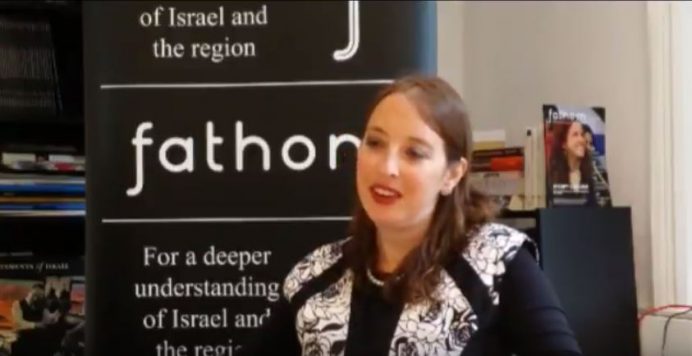‘What have we learned since 7 October?’, asks Sara Hirschhorn. Her reply: that the West is being lost and one story about Jewish survival may be ending — there is no possible return to the 10/6 mentality or reality. That Jews must now unite in Israel and in the diaspora, strengthen communal assets and resilience worldwide, forge new alliances and create parallel institutions. The moment to build the post-10/7 Jewish future is now, and the spirit of pre-1948 Zionism can help us.
We are living through a paradigm shift — the abrupt and appalling end to some of the stories we Jews have been telling ourselves in the 21st century about Jewish security and survival. Yet every time of mourning is also a time to reap meaning — the moment for the post 10/7 Jewish future is now.
On the Saturday morning of Simchat Torah, Israel witnessed the largest civilian slaughter of its citizens in its history, a veritable pogrom – the Shoah 2.0 of the State of Israel. We saw the slaughter of whole families sitting down for breakfast, of groups of friends partying at a music festival; we saw mothers and children bound together with wire and set on fire. Babies were murdered, women were raped, and toddlers and octogenarians were taken into captivity. One anguished father even exclaimed ‘Yes!’ when the military arrived at his door to inform him that his missing 8-year-old daughter was dead, preferring her swift murder to unknown barbarism as a child hostage. (In a cruel twist of fate, his daughter is now thought to be alive but taken into captivity from a neighbor’s slumber party, she may have commemorated her 9th birthday this week as a hostage in Gaza.) But what quickly became apparent was that when the world saw every kind of war crime — the State of Israel even put together a compilation of atrocities at Kibbutz Beeri to screen to ambivalent journalists —the world didn’t flinch.
With the handicap of history’s oldest hatred, Israel didn’t even get its 15 minutes of victimhood before everyone from Harvard students to the Secretary General of the United Nations started ‘context-washing’ a massacre. Then came the blood libel of the Al-Ahli hospital, which continues to be repeated (or to remain unretracted) by the international media and at least one US Congresswoman. Meanwhile, university campuses cheered the martyrs, demonstrators physically and verbally attacked Israeli and Jewish students and have pulled down posters of the kidnapped, and university officials made clear they had absolutely no intention of climbing out from underneath their desks to intervene in an orgy of hate. The streets of world capitals teemed with those expressing support for terror and chanting genocidal slogans about the people of Israel, and calls for a unilateral ceasefire echo from the Halls of Congress to grassy quadrangles to the Twitterverse. ‘Pogrom for Peace’ seems fair enough for much of the rest of the world, if not for Israelis.
World Opinion Lost?
By the time the reoccupation of Gaza ends — which could be anywhere from weeks to years from now — it’s clear that Israel will have lost the war for world opinion. What happens on college campuses, media desks, or street protests won’t stay there — it has already eroded support for Israel within the Democratic Party, the US State Department is in revolt, the military brass are frightened of a regional war, while the chattering class demanding absolute condemnation of Israel. Most Western governments are watching restive populations marching through their streets (occasionally stopping to smash glass and beat Jews on the street in a 21st century Kristallnacht) while its legislators choose their jobs over moral clarity and their representatives can’t even pass UN resolutions that use the words ‘Hamas’ ‘Israel’ or ‘hostages.’
Where will support for Israel be in a generation? While militarily superior today, Israel remains reliant on its so-called allies for military aid and diplomatic backing, as well as for economic investment. If this support dwindles or disappears in a few decades, how can Israel defend itself? Some of the worst case scenarios have to be confronted. Will an increasingly impoverished population be crammed into a ghetto in the centre of the country (only 8 miles from West Bank cities at the narrow waist) as the Southern Coast and North are attacked by rocket fire and periodic invasions? Lacking diplomatic support, will the IDF be forced to evacuate the West Bank without security guarantees or a final status agreement, in order to secure Israel’s ‘Auschwitz borders.’? Israel will never surrender — she will fight against Iranian (and world?) backed proxies to the end. Could there even come a day when a beleaguered and besieged Israel, reviled not only by its neighbours but by much of the West, is wiped off the map from the river to the sea?
If that happens, where will the remaining Jews flee to this time? Once, it was from Iberia to the Rhineland and beyond — even to the Arab, Muslim, and Asian world. Before the State of Israel, as Jews fled pogroms, poverty, empire, communism, Nazism, and consecutive world wars, there was also that great hope of America, the Goldinah Medinah. But the flames of antisemitism stoked by 10/7 have left much scorched earth across the United States. Even the re-education camps in China will likely look more pluralistic than US universities in a decade.
A New Jewish Future
What is emerging in the weeks since 10/7 is that several major chapters of Jewish history have simultaneously come to an end and no one can write a new Jewish story fast enough to satisfy the demands of the moment. With great humility I suggest five steps to secure a Jewish future.
1. Israeli Unity
For Israel, as an idea and for her own national security, unity is now a pre-requisite for survival. This includes not only the need for a semi-permanent national unity government but ‘achdut’ [solidarity] amongst the people. Divisions between Jews and Arabs must be effaced by common threats to survival. [A promising poll showed that over 70 per cent of Israeli-Arabs feel identified with the State, the highest pecentage in Israeli history.] The ultra-Orthodox can no longer opt-out of fighting for the State or contributing to its economic survival. [Some 3,000 have volunteered for the army draft since war broke out, with many more supporting their own communities through public service.] Religious and secular, rich and poor, Ashkenazi and Mizrachi, dovish and hawkish can disagree on policy goals but those debates can never again threaten the fundamental protection of the State of Israel. Eventually, Israel will need to unify geographically and economically, ceding the most vulnerable parts of its territory to ensure defensible borders and to close the yawning gaps between rich and poor for the common good. As difficult and painful as these efforts will be, they offer Israel’s best chance of survival.
2. Diasporic Moderation
For both Israel and Western Jewry to survive, cohesion is also a pre-condition. Perhaps it may be necessary to consider more geographic amalgamation, not least so that new security apparatii can respond to violent threats and so that educational, religious, social, and cultural platforms can share limited resources (especially as parallel institutions will need to be supported.)
Yet, the main challenge facing American Jewry is ideological. It can no longer sacrifice its future to a fruitless and ahistorical argument about whether antisemitism emanates primarily from the Left or the Right when it’s coming from both. We must harden our communal assets. It is also incumbent upon American (and Western) Jewish leaders and educators to inculcate in the next generation that a centrist identity is where Jewish safety resides and this requires our communal institutions and leaders to have red lines that mark off the boundaries of our own community from extremism . We must make clear, full-throatedly, that extremism is a threat to all and that we cannot guarantee the safety or security of those who insist on being outside the ‘big tent’ on either side. The thin median of moderation must become our new Goldinah Medinah.
3. New Allies
It is clear that the old model of allyship is broken — in our time of Jewish greatest need, our so-called traditional allies in other identity politics groups, other minorities, other oppressed peoples, simply didn’t show up. Not only did they not raise a call in our defence, many cheered our annihilation, have perpetrated acts of antisemitism in the Diaspora, and have led the charge in denying Israel the right to defend herself. While there are many sound arguments for Jews and Israelis ‘going it alone’ in light of these circumstances, it is possible to also consider a new model of allyship with those who do support Jews and the Jewish State — some (particularly American Jews) may feel that they must hold their noses, but Evangelicals, Republicans, and non-aligned nation-states have their own theological or strategic reasons for supporting Israel and the Jewish people. In time, the Abrahamic Accords and normalisation with Israel could also flourish again as Arab leaders acknowledge publicly, as much as privately, the necessity of an anti-Iran axis, the economic and strategic benefits of relations with Israel, and the danger of Islamic extremists like Hamas to the entire region. We cannot dismiss the reality of our policy differences, but we cannot spurn the support of those who would help invest — literally and metaphorically — in Jewish safety and security. These may be unconventional and limited partnerships, but Israel and the Jews need all the friends they can get at this precipitous moment.
4. Parallel Institutions
It may not be possible or desirable for Jews to return to many of the educational, political, and even economic institutions that have proved themselves to be a threat to Jewish safety. While at great financial and moral cost, it will be necessary for the Jewish community to open its pockets to meet the needs of the moment — and the necessities of tomorrow — to create parallel institutions for the protection and preservation of Jewish lives and Jewish identities. What forms these may take are yet uncertain — if it seems likely that higher education may need to be the first priority — but it may ultimately be that Jewish safety and survival will be as a State within a State.
5. Planning for a New Zion?
It is almost impossible — and impermissible — to think of a day where the State of Israel no longer exists. But should that come to pass, is there any hope that Jewish sovereignty can be restored without the Zion of our dreams? I hope we never have to consider a world without a State of the Jews, but we can take heart from this: that was the only reality Zionists ever knew before 1948. Perhaps their spirit, and their debates – over territory, sovereignty, spiritual centers, universalism and particularism, can be the ‘smash in the case of emergency’ toolkit we look to if that grim and terrible day ever comes to pass, so that we may in time know our own nation once again.
The Jewish future underwent a paradigm shift on and after 10/7 – it is incumbent upon us to face up to that fact and find a new way forward.




































